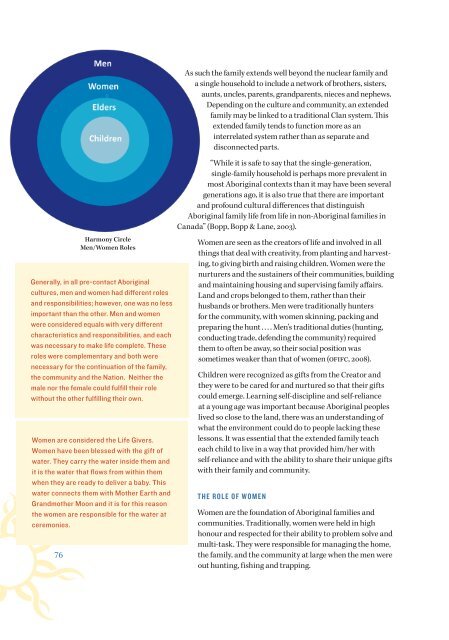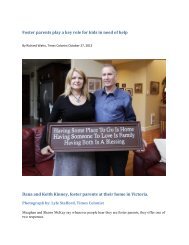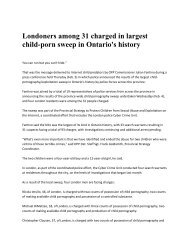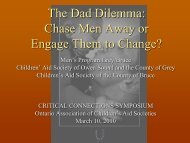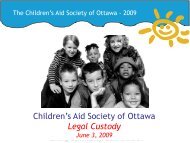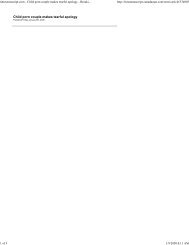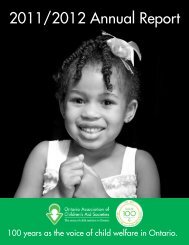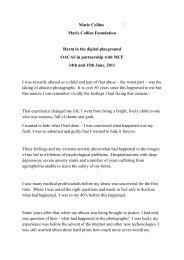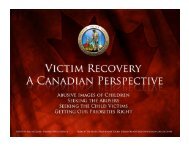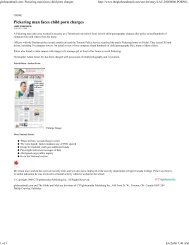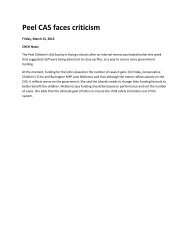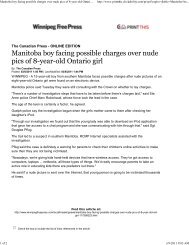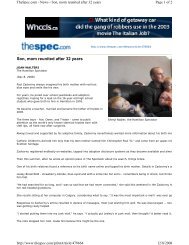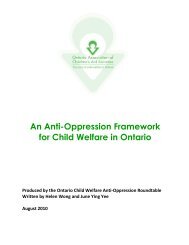English - Ontario Association of Children's Aid Societies
English - Ontario Association of Children's Aid Societies
English - Ontario Association of Children's Aid Societies
You also want an ePaper? Increase the reach of your titles
YUMPU automatically turns print PDFs into web optimized ePapers that Google loves.
76<br />
Harmony Circle<br />
Men/Women Roles<br />
Generally, in all pre-contact Aboriginal<br />
cultures, men and women had different roles<br />
and responsibilities; however, one was no less<br />
important than the other. Men and women<br />
were considered equals with very different<br />
characteristics and responsibilities, and each<br />
was necessary to make life complete. These<br />
roles were complementary and both were<br />
necessary for the continuation <strong>of</strong> the family,<br />
the community and the Nation. Neither the<br />
male nor the female could fulfill their role<br />
without the other fulfilling their own.<br />
Women are considered the Life Givers.<br />
Women have been blessed with the gift <strong>of</strong><br />
water. They carry the water inside them and<br />
it is the water that flows from within them<br />
when they are ready to deliver a baby. This<br />
water connects them with Mother Earth and<br />
Grandmother Moon and it is for this reason<br />
the women are responsible for the water at<br />
ceremonies.<br />
As such the family extends well beyond the nuclear family and<br />
a single household to include a network <strong>of</strong> brothers, sisters,<br />
aunts, uncles, parents, grandparents, nieces and nephews.<br />
Depending on the culture and community, an extended<br />
family may be linked to a traditional Clan system. This<br />
extended family tends to function more as an<br />
interrelated system rather than as separate and<br />
disconnected parts.<br />
“While it is safe to say that the single-generation,<br />
single-family household is perhaps more prevalent in<br />
most Aboriginal contexts than it may have been several<br />
generations ago, it is also true that there are important<br />
and pr<strong>of</strong>ound cultural differences that distinguish<br />
Aboriginal family life from life in non-Aboriginal families in<br />
Canada” (Bopp, Bopp & Lane, 2003).<br />
Women are seen as the creators <strong>of</strong> life and involved in all<br />
things that deal with creativity, from planting and harvesting,<br />
to giving birth and raising children. Women were the<br />
nurturers and the sustainers <strong>of</strong> their communities, building<br />
and maintaining housing and supervising family affairs.<br />
Land and crops belonged to them, rather than their<br />
husbands or brothers. Men were traditionally hunters<br />
for the community, with women skinning, packing and<br />
preparing the hunt . . . . Men’s traditional duties (hunting,<br />
conducting trade, defending the community) required<br />
them to <strong>of</strong>ten be away, so their social position was<br />
sometimes weaker than that <strong>of</strong> women (OFIFC, 2008).<br />
Children were recognized as gifts from the Creator and<br />
they were to be cared for and nurtured so that their gifts<br />
could emerge. Learning self-discipline and self-reliance<br />
at a young age was important because Aboriginal peoples<br />
lived so close to the land, there was an understanding <strong>of</strong><br />
what the environment could do to people lacking these<br />
lessons. It was essential that the extended family teach<br />
each child to live in a way that provided him/her with<br />
self-reliance and with the ability to share their unique gifts<br />
with their family and community.<br />
THE ROLE OF WOMEN<br />
Women are the foundation <strong>of</strong> Aboriginal families and<br />
communities. Traditionally, women were held in high<br />
honour and respected for their ability to problem solve and<br />
multi-task. They were responsible for managing the home,<br />
the family, and the community at large when the men were<br />
out hunting, fishing and trapping.


